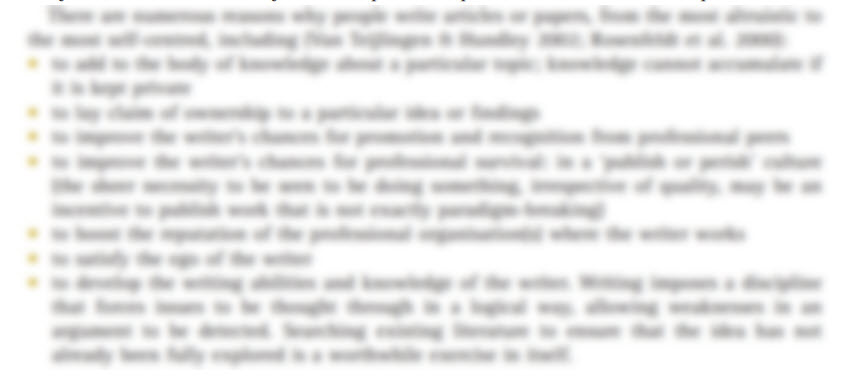There are many obstacles that can prevent us from being productive and efficient writers, especially procrastination. Even if there is a looming deadline and we are well aware of what needs to be written, sometimes we simply don’t feel like writing. And if we don’t feel like writing, procrastination can creep in, and we might put off writing until the last minute and then produce something that is substandard or incomplete.
Here are four ways to set you on the path of writing, even when you don’t feel like it.
1. Write intensively for short blocks of time
Set a timer and commit to writing for only 30 minutes. Thirty minutes of writing might seem achievable when you don’t feel like writing. Tell yourself that after the 30 minutes is up, as a reward, you will allow yourself to do whatever you want for one hour. Commit to only write for 30 minutes and make sure that you don’t do anything else during that period: no re-reading what you wrote previously, no stopping to google something, no telephone, no talking. Just write. If you find this too hard, start with ten minutes.
If you are normally a productive writer, 30 minutes might not seem like a long time, yet 30 minutes writing is much better than not writing at all. We can write a lot within short time periods if we don’t allow ourselves to get distracted, especially with other work tasks.
Avoid setting the timer for too long a period. Avoid setting unrealistic goals for yourself as you will feel unproductive and unsatisfied if you don’t meet them.
When you set a timer, try placing it out of reach so you have to get up from your computer to turn it off. After 30 minutes, stand up and walk around, print out what you have written so you have physical evidence of your productivity. You may find that you want to reset the timer for another 30 minutes and keep going. Ultimately, you may find that setting these writing blocks allows you to break through the barrier of just getting started.
2. Don’t switch between writing tasks during a designated writing session
During your writing sessions, only compete one type of writing. If you are getting your thoughts down, just write freely and don’t switch to editing or proofreading halfway through. If you are rewriting a section of your document, don’t switch to writing new material on a related topic.
3. Take a break from the computer: print your document out and use a pen
We spend a large proportion of our time in front of a computer for all sorts of work activities, especially writing. Periodically take a break from writing on a computer, even if it is for a short time. Try printing out the latest draft of your document and take it to a café or a lounge chair with a pen and a notebook. Edit your draft by hand and use a notebook to write fresh material. You might find that the change in environment allows you to relax yet you can still work on your document.
I always print my document out whenever I complete a draft so that I can see how my writing looks on paper and then plan what writing I will do for the next draft. With a paper printout, I can see my whole document at a glance, without having to scroll through a digital version on a computer screen. Moving to a lounge or a comfortable environment, gives me a break from staring at a computer screen and sitting on an office chair.
4. Find a friend to write with
Writing is usually a solitary activity but you might it more enjoyable if you organise writing sessions with a friend or colleague. Try taking your laptops to a park or a café and set up 30-minute writing sessions followed by 30 minutes social chat. You could also read and give feedback on each other’s work.
And remember…
Avoid creating unrealistic expectations that create stress and reduce our work satisfaction. It is unrealistic to expect that we can be super-productive writing machines that can write anything, anywhere and at any time. Aim to write in intensive pre-organised, short blocks of time in an environment that is as comfortable and distraction-free as possible.
© Dr Marina Hurley 2023 www.writingclearscience.com.au
FURTHER READING
- 11 common mistakes when writing an abstract
- The essentials of science writing: identify your target audience
- Co-authors should define their roles and responsibilities before they start writing
- Critique all writing advice
- When to cite and when not to
- Back to basics: science knowledge is gained while information is produced
- How to build and maintain confidence as a writer
- If science was perfect, it wouldn’t be science
- The essentials of science writing: What is science writing?
- 8 steps to writing your first draft
- Two ways to be an inefficient writer
- Work-procrastination: important stuff that keeps us from writing
Any suggestions or comments please email info@writingclearscience.com.au
Find out more about our new online course...
Now includes feedback on your writing Learn more...
SUBSCRIBE to the Writing Clear Science Newsletter
to keep informed about our latest blogs, webinars and writing courses.





